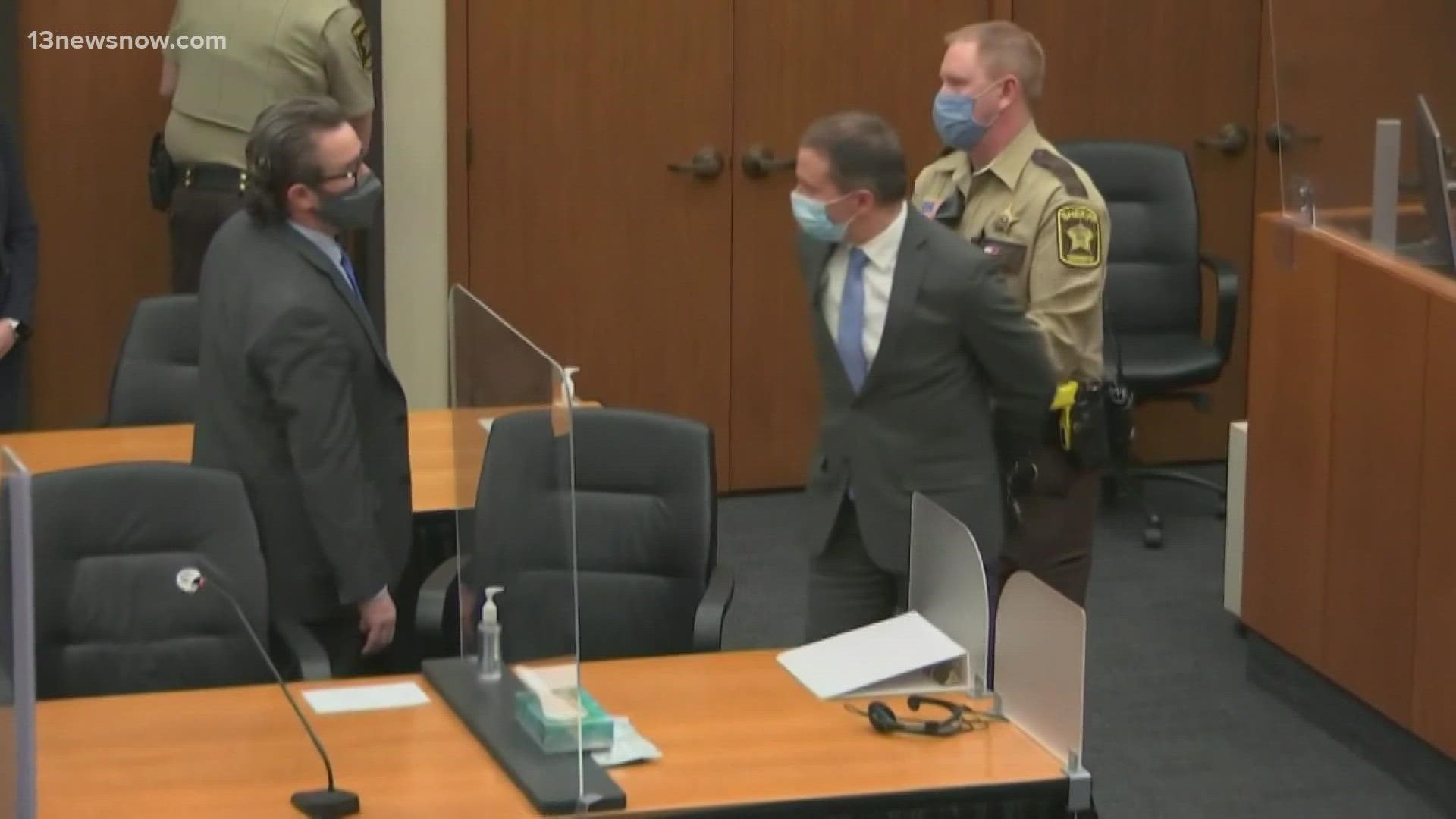ST PAUL, Minn. — Former Minneapolis police officer Derek Chauvin was sentenced to 21 years in prison on federal charges that he violated George Floyd's civil rights at the time of his death in May 2020.
The judge gave Chauvin credit for the seven months he already served, bringing his sentence moving forward to 245 months, or just over 20 years.
Chauvin pleaded guilty to the federal charges back in December, admitting for the first time that he kept his knee on Floyd’s neck — even after he became unresponsive — resulting in Floyd's death.
George Floyd's brother, Philonise, appeared in the courtroom to deliver a victim impact statement, and a written statement was read from Floyd's girlfriend, Courteney Ross, who said she misses the life she had with George Floyd, and that she and her children are still adjusting to their "new reality."
"Mr. Chauvin, I do not hate you. I am still working to forgive you," Ross said in her statement to the court.
Derek Chauvin's mother also spoke to the court, saying her son often put the Minneapolis Police Department before his family, and asked the judge to send Chauvin to a nearby federal facility.
Chauvin himself spoke briefly at the sentencing hearing, where he told George Floyd’s family that he “wishes all the best” for Floyd’s children, though he did not issue a direct apology.
Before handing down the sentence, Judge Paul Magnuson spoke to Chauvin directly. "I really don’t know why you did what you did. But to put your knee on another person’s neck until they expire is simply wrong and for that conduct you must be substantially punished."
John Pope also spoke at the hearing. As part of his federal plea deal, Chauvin admitted to using excessive force against Pope when he was 14 years old in 2017.
The plea deal called for Chauvin to serve his federal and state sentences at the same time and to be transferred from a Minnesota state prison to a federal prison, where experts say he likely will be safer and may be held under less restrictive conditions.


"Chauvin showed that he had no conscience, he showed no empathy," Philonise Floyd told reporters after the sentencing hearing. "He showed no compassion. I just don't understand, in this world, why? I want to be able to ask him, 'Why? Why did he do that?'"
Minnesota Attorney General Keith Ellison, who led Chauvin's prosecution in state court, called the sentence "another step of accountability on the road to justice," in a statement released Thursday afternoon.
He also thanked the U.S. Attorney's Office and Department of Justice for prosecuting Chauvin's case, writing "it was appropriate and right that they stepped in."
“In no uncertain terms, George Floyd should be alive today,” said Assistant Attorney General Kristen Clarke for the Justice Department’s Civil Rights Division in a statement. “Chauvin’s use of excessive force and his failure to provide medical care resulted in Mr. Floyd’s senseless murder. Chauvin’s unlawful actions in a separate incident also resulted in injury to a 14-year-old child ... While no amount of prison time can reverse the tragic consequences of Derek Chauvin’s violent actions, we hope that this sentence provides some small measure of justice for the families and communities impacted.”
“Derek Chauvin abandoned his sworn oath to uphold the sanctity of life when he callously took George Floyd’s life and when he violently assaulted a 14-year-old child. Chauvin’s actions constituted a grave abuse of police authority and a clear violation of these individuals’ civil rights,” said U.S. Attorney Andrew M. Luger in a statement. “To the victims, their families, and to the broader community: although the harm that Chauvin caused will never be erased, today’s sentence of more than 20 years in prison represents a measure of justice and accountability.”
In April 2021, a state jury found Chauvin guilty of second-degree manslaughter, second-degree murder and third-degree murder in Floyd’s death, making him the first white police officer to be found guilty of murdering a Black man in Minnesota. Hennepin County Judge Peter Cahill handed down a 22 1/2 year sentence on those counts.
For his own safety, Chauvin, 46, had been held since his conviction in “administrative segregation” at the state's maximum security prison at Oak Park Heights. He's been largely confined to a 10-by-10-foot room, which he’s been allowed to leave for an average of one hour a day for exercise.
If Chauvin were in the general population of a Minnesota state prison, he'd be at risk of running into inmates he had arrested or investigated when he was a Minneapolis officer, said Rachel Moran, another law professor at St. Thomas. While he can’t totally escape his notoriety in a federal prison elsewhere, she said, he’s unlikely to encounter inmates with such a direct, personal grudge.
State prison populations are heavy on violent offenders, including people convicted of murder, robbery and rape, Heffelfinger said. Federal prisons also hold inmates with violent backgrounds, he added, but they're more likely to house nonviolent drug dealers, white-collar criminals and the like.
Assuming the bureau decides Chauvin is safe enough in the general population, he’ll have more chances to move about, to work and to participate in programming. Those opportunities would vary with the security level and the individual facility.
The three other former officers charged in connection to Floyd's murder, Tou Thao, J. Alexander Kueng and Thomas Lane, were all found guilty in federal court in Feb. 2022 on civil rights charges related to Floyd's death.
Lane has also pleaded guilty to a state count of aiding and abetting manslaughter, while Thao and Kueng face an October trial on state charges of aiding and abetting both second-degree murder and second-degree manslaughter.
Watch more on the Trial of Derek Chauvin:
Watch the latest coverage on the death of George Floyd and the trial of Derek Chauvin in our YouTube playlists:

